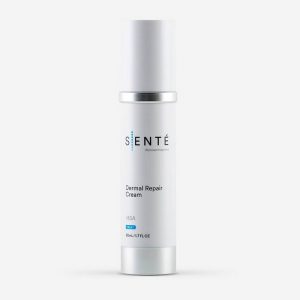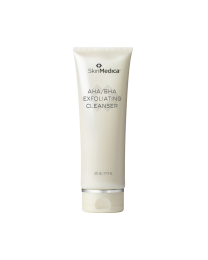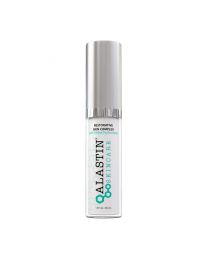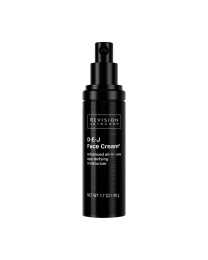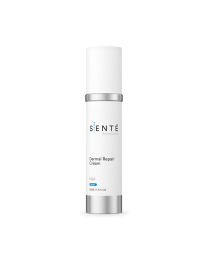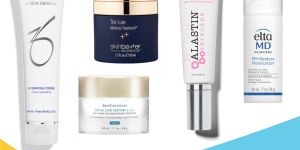Free Shipping Over $100
Free Samples With Every Purchase
Auto Replenishment Available
Authorized Reseller
Skincare FAQs | How to Layer Skincare Products

If you’re looking to improve your skincare routine, one of the best things you can do for your skin is learn how to properly layer your products and which ingredients you should avoid using together. In this blog, the trusted dermatologists who curated the list of skincare products available at Derm Skincare will break down the basics of how to layer your skincare products and what ingredients just won’t play well together, so you can revamp your morning and evening skincare routine.
The Basic Rule of Skincare Product Layering
We’ll get into the specifics of your skincare routine in the next two sections, but before we even talk about specific skincare routines and products, there is one simple rule that makes applying your skincare products easy. Simply apply your products in the order from thinnest to thickest. You’ll use the thinnest products first. Then, layer on thicker products. The idea is that your skincare products that have a thinner consistency should be absorbed more quickly. When you apply them first, the ingredients will be fully worked into your pores. Thicker products like moisturizers, especially those that contain barrier ingredients, will sit on top of the skin longer, making it more difficult for the active ingredients in thin skincare products to penetrate into pores. This rule of thumb applies to all products except sunscreen, which will always be the last product you apply.
An Effective Morning Skincare Routine

Your morning skincare routine should focus on protection. Throughout the day, sunlight, pollutants, environmental allergens, and other irritants will assault the skin. Preventing damage from these factors is essential. For this reason, your morning skincare routine should include the following:
- Cleanser – use a gentle cleanser to wash away the oils and grime that have accumulated on the skin overnight.
- Toner – apply a toner to restore the skin’s pH and open pores to ensure other products are readily absorbed as applied.
- Antioxidant serums – individual serums can be chosen to achieve specific goals, but a simple option is to use antioxidant-rich vitamin C serums in the morning. These products protect against UV damage from the sun and help to reverse existing UV damage with regular use.
- Spot treatments – if you struggle with acne, eczema, rosacea, psoriasis, or other chronic skincare concerns, apply treatments for these conditions.
- Eye cream – apply an eye cream to protect and hydrate the thinner, more sensitive skin around the eyes.
- Moisturizer – apply a good facial moisturizer to the face and neck. During the day, you can use a lightweight moisturizer, especially if your skin is oily.
- Sunscreen – never skip your sunscreen. Choose a product that protects against both UVA and UVB rays, this is often marketed as “broad spectrum.” You may need a stronger sunscreen based on your skin type, but SPF 30 or higher is typically effective for most people.
An Effective Evening Skincare Routine
Your evening skincare routine should be geared toward healing and recovery. After the damaging effects of the day, your evening skincare routine should replenish, repair, and soothe your skin. A good evening routine should include:
- Remove cosmetics – if you use cosmetics, remove these products using a gentle makeup remover. Removing makeup with cleanser alone can lead to excessive scrubbing on the skin that may cause irritation. Makeup removers allow make to be broken down and washed away more easily.
- Cleanser – you can use the same gentle cleanser in the morning and evening.
- Toner – again, toner helps to open pores and restore pH balance to the skin. If you have very sensitive skin, you may need to choose a gentle toner or limit toner usage to once a day. Consult with a dermatologist for personalized recommendations.
- Retinol – because retinol is sun reactive, it’s important to use this product at nighttime. Retinols can be very harsh, so make sure you start with the lowest concentration. Then, you can work your way up to higher concentrations over time. If you have especially sensitive skin, you can try the “sandwich method” to apply your retinol. For this method, first, you apply moisturizer, then retinol, followed by another layer of moisturizer. If you notice itchy, irritated, or dry skin, you may be experiencing a common set of retinol side effects called retinization. Consult with a dermatologist about changing products or adjusting your routine to minimize symptoms.
- Serums – nighttime serums should include hydrating and soothing ingredients, especially if you’re using retinol. Look for products with ingredients like hyaluronic acid that can help to repair damaged skin and restore health and hydration.
- Eye cream – in the evening, you can utilize the same eye cream you use during the day or include a heavier, more hydrating eye cream to help replenish moisture. This may be especially beneficial if you notice dry skin, dark circles, or deep pits around the eyes.
- Moisturizer – in the evening, use a thick, cream-based moisturizer to replenish the hydration you lost during the day and soothe your skin as you sleep.
Skincare Product Recommendations
It’s always best to consult with a dermatologist to get product recommendations that are specific to your skincare needs. However, some of the products our dermatologists commonly recommend include:
Cleansers
Any gentle cleanser will work for most skin types. Look for products that have fewer ingredients or options that can be mixed and matched to achieve different results. Our top two recommendations are an everyday cleanser and an exfoliating cleanser.
 ALASTIN Skincare Gentle Cleanser – this everyday cleanser is gentle enough for all skin types, and it can be used morning and evening. It offers a thorough clean that will not strip all the moisture out of the skin or cause irritation.
ALASTIN Skincare Gentle Cleanser – this everyday cleanser is gentle enough for all skin types, and it can be used morning and evening. It offers a thorough clean that will not strip all the moisture out of the skin or cause irritation.- SkinMedica AHA/BHA Exfoliating Cleanser – this is an exfoliating cleanser. You can use it a few times a week in the morning to replace your everyday cleanser. Regular exfoliation removes dead skin cells, promotes healthy skin cell turnover, and boosts the production of collagen and elastin.
Serums
As we noted before, always layer your products from thinnest to thickest. After applying a serum, wait at least 30 seconds to ensure it has been fully absorbed. Additionally, you should avoid layering more than two serums at a time as this impedes serum absorption and may trigger an adverse reaction if the ingredients don’t mix well. You should always avoid combining serums that include retinol and alpha and beta hydroxy acids (AHA/BHAs). This can cause significant skin irritation and inflammation. This combination may be recommended to improve the appearance of skin that has uneven skin tone or texture or acne-related hyperpigmentation. You should also avoid mixing vitamin C with AHAs and BHAS. Again, this combination may lead to increased skin reactivity as well as sun sensitivity. In the mornings you use an exfoliating cleanser, you may want to substitute a hydrating serum instead of a vitamin C serum. Be careful when combining acids. If a serum combines multiple types of acids, they have been formulated specifically to optimize results and minimize side effects. Combining potent formulations of several acids at a time can cause unnecessary irritation.
- SkinCeuticals CE Ferulic – this is the thinnest serum we’ll recommend. When it’s used, it should be the first product you apply. This advanced formulation combines vitamins C and E with ferulic acid to protect against sun damage and other free radical damage, keeping skin looking healthier. It’s recommended for use as part of your morning skincare routine.
 ALASTIN HA Immerse – a bit thicker than the SkinCeuticals serum, this hyaluronic acid product is designed for deep hydration. Unlike other ingredients that have acid in their name, hyaluronic acid helps to soothe and hydrate skin. If addition to a short-term increase in moisture, ALASTIN HA Immerse helps the skin produce more hyaluronic acid naturally, leading to long-lasting results. It can be used morning, evening, or both.
ALASTIN HA Immerse – a bit thicker than the SkinCeuticals serum, this hyaluronic acid product is designed for deep hydration. Unlike other ingredients that have acid in their name, hyaluronic acid helps to soothe and hydrate skin. If addition to a short-term increase in moisture, ALASTIN HA Immerse helps the skin produce more hyaluronic acid naturally, leading to long-lasting results. It can be used morning, evening, or both.- SkinMedica TNS Advanced + Serum – this product is a little less thin than the first two. It’s not thick though. It has a lightweight formula that is still easily absorbed, and because it’s dye and fragrance-free, this product is beneficial for all skin types. It is one of the only serums on the market clinically proven to address deep lines and wrinkles and even improve the appearance of sagging skin. It can be used morning, evening, or both.
 Sente Dermal Repair Cream – this is a thicker formula serum that would be beneficial in the evenings. It helps to repair sun-damaged and aging skin and create an even skin tone and texture. It can be used morning, evening, or both.
Sente Dermal Repair Cream – this is a thicker formula serum that would be beneficial in the evenings. It helps to repair sun-damaged and aging skin and create an even skin tone and texture. It can be used morning, evening, or both.- ALASTIN Restorative Skin Complex with TriHex Technology – this is the thickest serum we’re recommending. The healing TriHex technology promotes skin cell turnover and improves the natural production of collagen and elastin. Good for most skin types, but especially beneficial for aging skin. It’s a great option to soothe and hydrate skin overnight.
- Revision Skincare D.E.J. Eye Cream – this product isn’t technically a serum, but it’s not really a moisturizer either. Eye creams are a unique combination of both, and the Revision Skincare D.E.J. eye cream certainly helps to improve the health and appearance of sensitive skin around the eyes while ensuring lasting hydration.
Retinols
You may hear these products referred to as retinols or retinoids, but there is technically a difference. Retinoids are prescription-strength products, and retinols are less potent variations you can purchase over the counter. Whether you’re using a retinol or retinoid, the goals are the same. Retinols promote skin cell turnover. They dissolve dead skin cells to reveal healthier skin below. This diminishes the appearance of fine lines and wrinkles, skin discoloration, and even scarring with regular use. Retinols can also keep pores clear, making them essential for those with acne-prone skin. Because of the possible side effects, those with sensitive skin are always recommended to consult with their dermatologist before using retinols.
- SkinCeuticals Retinol 0.3 – This is a great option if you have never used retinols before. It has a very low concentration, which minimizes the risk of skin irritation and inflammation. It’s recommended for acneic and aging skin, but it’s safe for most skin types.
- Revision Skincare Retinol Complete 0.5 – Slightly stronger than the SkinCeuticals retinol above, this product is formulated with time-released retinols and botanical ingredients to minimize any adverse side effects. It’s one of the best options for aging skin, and even those with sensitive skin are often able to use this product with little to no reactivity.
 Sente Bio Complete Serum – This is another product formulated with sustained-release retinol, making it safe and effective for most skin types, including aging and even sensitive and acne-prone skin. It combines retinol with Heparan Sulfate Analog (HSA) technology to help skin look smoother and more youthful while promoting hydration.
Sente Bio Complete Serum – This is another product formulated with sustained-release retinol, making it safe and effective for most skin types, including aging and even sensitive and acne-prone skin. It combines retinol with Heparan Sulfate Analog (HSA) technology to help skin look smoother and more youthful while promoting hydration.
Moisturizers
Even if you have naturally oily or acne-prone skin, moisturizing is an essential part of your skincare routine. When you provide your skin with adequate hydration, it prevents the overproduction of natural oil called sebum which can lead to clogged pores and skin that looks oily or shiny. The right moisturizer added to your morning and evening skincare routine will help keep the moisture levels balanced.
 SkinCeuticals Triple Lipid Restore 2:4:2 – this product is safe and effective for all skin types, but it’s best for aging or dry skin. It restores lost ceramides, fatty acids, and lipids from the skin. Loss of these skin lipids contributes to skin looking wrinkled, dull, or having an uneven texture. Thick and hydrating enough to be used at night, this easily absorbed formula can also be applied in the morning.
SkinCeuticals Triple Lipid Restore 2:4:2 – this product is safe and effective for all skin types, but it’s best for aging or dry skin. It restores lost ceramides, fatty acids, and lipids from the skin. Loss of these skin lipids contributes to skin looking wrinkled, dull, or having an uneven texture. Thick and hydrating enough to be used at night, this easily absorbed formula can also be applied in the morning.- ALASTIN Ultra-Light Moisturizer with TriHex Technology – for those who have sensitive skin, who have just received a dermatologic treatment, and those dealing with a flareup in chronic skin conditions, this should be your go-to moisturizer. It’s gentle but deeply nourishing and hydrating. It is ultra-lightweight and oil-free, making it easily absorbed by people with all skin types. It’s non-comedogenic, meaning it’s even safe for acneic skin. ALASTIN Ultra-Light Moisturizer with TriHex Technology is best when used as part of a morning skincare routine, but it can also be used in the evenings, especially in humid areas.
- Revision D.E.J. Face Cream – like the eye cream we recommended above, this moisturizer is effective for aging and sensitive skin. Intense hydration helps to repair the skin’s microbiome, so it can absorb and retain moisture more effectively. It also adds fullness to thinning skin. Recommended as part of your skincare routine in the morning, evening, or both.
Sunscreens
Everyone should apply sunscreen daily to all areas that will receive sun exposure. While any sunscreen is better than none at all, there are some options that are superior. Below, we’ve outlined a few of our favorite sunscreens for year-round protection.
- MD Skin Essentials Silk Shield – mineral sunscreens tend to be safer and more effective than the chemical options, but anyone who’s used a mineral sunscreen knows that they leave a chalky, white film over the skin that takes forever to absorb. Not the MD Skin Essentials Silk Shield. This completely mineral sunscreen has a silky formula that is easily and fully absorbed in seconds, so you never have to stand around waiting for your skin to finally soak up all that sunscreen. It also helps to protect against both UVA and UVB rays from the sun as well as preventing photoaging and sun damage and providing a hydrating boost.
 Colorescience Flex – this product is one of the most innovative sunscreen options on the market. It’s available in a range of tints that flex to provide even coverage for a range of skin tones. Once applied, the skin immediately looks smoother and healthier. The antioxidant-rich formulation protects effectively against sunlight, blue light, infrared light, and pollution. The antioxidants also help to reverse previous sun damage for healthier skin.
Colorescience Flex – this product is one of the most innovative sunscreen options on the market. It’s available in a range of tints that flex to provide even coverage for a range of skin tones. Once applied, the skin immediately looks smoother and healthier. The antioxidant-rich formulation protects effectively against sunlight, blue light, infrared light, and pollution. The antioxidants also help to reverse previous sun damage for healthier skin.- Revision Intellishade Original – what if we told you that one tinted sunscreen could flawlessly match any skin tone while effectively protecting against sun damage and offering added hydration? It sounds too good to be true, but thanks to the Revision Intellishade Original, it’s entirely possible to get all of that in one product. With daily use, it helps improve skin tone and texture, reverses signs of aging, and improves skin hydration all while protecting against the sun’s UVA and UVB rays.
- ISDIN Eryfotona Ageless Ultralight Emulsion Broad Spectrum – this is another mineral sunscreen that is formulated to be lightweight and easily absorbed. The versatile tint blends seamlessly with all skin tones and offers increased protection against the sun’s UVA and UVB rays. Formulated with DNA repair some, this sunscreen actually repairs skin damage at the cellular level for healthier, younger-looking skin.
Talk to a Dermatologist
While the basic skincare routines and product recommendations here are a great starting point, it’s always beneficial to talk to a professional. Each person has unique skincare needs, and a dermatologist can help you find products that will address your individual needs and keep your skin looking and feeling its best for years to come. Dermatologists can also help you find treatments that would address chronic skin issues, reverse signs of aging, address the appearance of scars, and improve overall skin health.
Want More Skincare Product Recommendations & Tips?
Derm Skincare was created by dermatologists to provide patients with easy access to our most recommended skincare products as well as information about how to use these products correctly within your daily skincare routines. You can explore the Derm Skincare site to learn more about all we have to offer and get more recommendations for skincare products that will meet your unique needs.
-
Colorescience Sunforgettable Total Protection Face Shield FLEX SPF 50 - Deep (55 ml)Regular Price $54.00 Now Only $43.20




